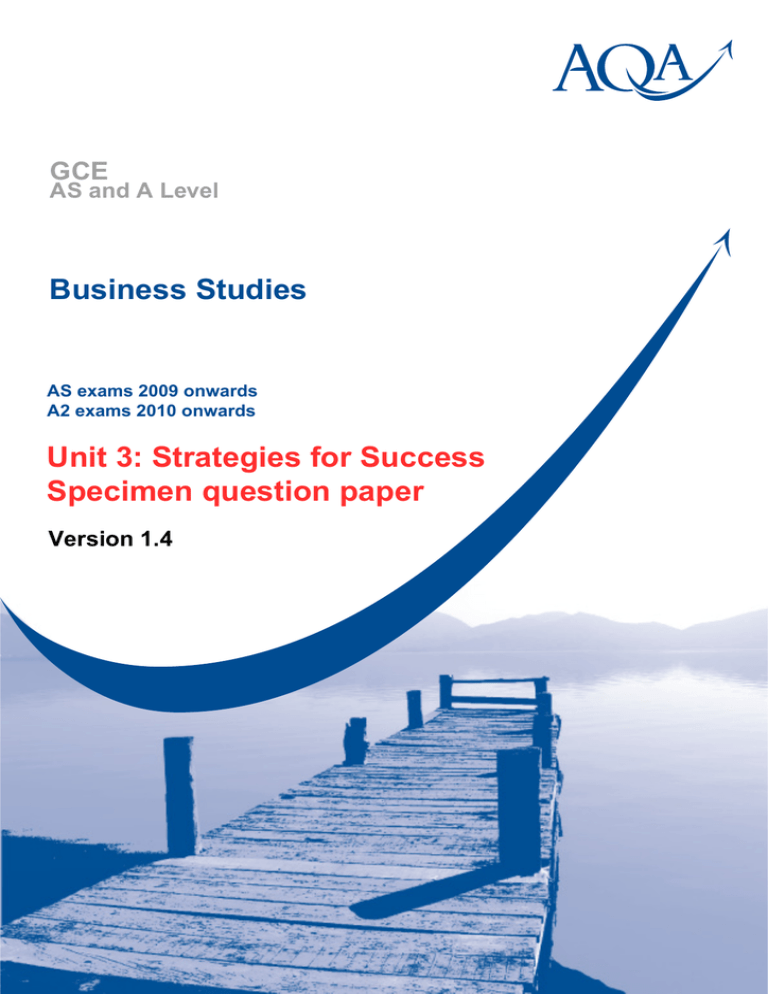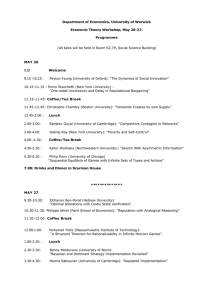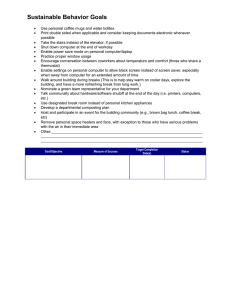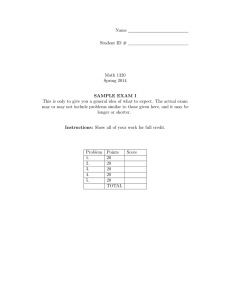
GCE
AS and A Level
Business Studies
AS exams 2009 onwards
A2 exams 2010 onwards
Unit 3: Strategies for Success
Specimen question paper
Version 1.4
This page has been left blank
VERSION 2.0
General Certificate of Education
Specimen Paper for 2009 and 2010
Advanced Level Examination
BUSINESS STUDIES
Unit 3
BUSS3
abc
Strategies for Success
For this paper you must have:
• a 12-page answer book.
You may use a calculator.
Time allowed: 1 hour 45 minutes
Instructions
• Use black ink or black ball-point pen.
• Write the information required on the front of your answer book. The Examining Body for
this paper is AQA. The Paper Reference is BUSS3.
• Answer all questions.
• Do all rough work in the answer book. Cross through any work you do not want to be
marked.
Information
• The maximum mark for this paper is 80.
• The marks for questions are shown in brackets.
• Questions 1, 3 and 4 should be answered in continuous prose. In these questions you will be
marked on your ability to use good English, to organise information clearly and to use
specialist vocabulary where appropriate.
BUSS3
AQA GCE Business Studies Specimen Unit 3
2
Read the Case Study and answer all the questions that follow.
Home or abroad?
Coffee Delight plc was a late arrival in the UK coffee shop market. By 2005 the boom in this market
was practically over. The London market was saturated and companies looked to the UK’s regional
markets for further sales growth. However, these were highly competitive with regional chains such as
Chocolatesoup putting pressure on sales figures, prices and profits.
Coffee Delight plc operates combined coffee bars and sandwich shops with internet access available in
most outlets. The company uses its space intensively to give a ‘busy, active’ feel which customers say
they like. The company’s main aim is growth and it has gained a 6% share of the UK market with its
clearly branded shops. Market research shows high brand recognition amongst UK consumers. Coffee
Delight plc controls budgets centrally and seeks to minimise its costs of production.
The company conducts regular market research (using technology such as the Internet whenever
possible) and uses this information to shape its promotional activities. The company is consistent in its
use of very competitive prices for nearly all its products to win customers.
Business analysts view Coffee Delight plc’s operations as highly efficient. The company seeks to locate
its outlets just off high streets and outside shopping malls. Despite its cost effectiveness, the quality of
its products and service are acknowledged by customers and competitors. The company uses the latest
technology to prepare its food and drink, and its outlets’ opening hours are longer than most of its rivals.
The company’s HR strategy is ‘hard’ and has two main elements. It employs a core staff of managers
who are highly trained and receive competitive salaries plus benefits. The majority of these managers
work at the head office where all significant decisions are taken. However, most of the workforce
receives hourly rates (many at the level of the minimum wage), plus bonuses if sales targets are met.
Some employees have expressed dissatisfaction with wage rates and, in the London outlets, there is an
ongoing threat of industrial action. Managers are given ongoing training and the company invests in
regular hygiene and customer service training for its coffee shop employees.
Coffee Delight plc’s sales forecasts suggest that growth in market share in the UK will be a tough target.
Coffee Delight plc’s Chief Executive, Sascha Grey, believes that, although growth in sales is possible in
the UK’s regional markets, other opportunities exist in overseas markets.
THE DECISION
Sascha Grey and Coffee Delight plc’s other directors met to discuss the company’s future direction.
Sascha started by saying he had two options and some relevant data (shown in Appendices A to D).
AQA GCE Business Studies Specimen Unit 3
3
Sascha explained that some competitors have been very successful in expanding into the new member
states of the EU. “An option is to expand into one of the European Union’s newest member states.
Romania is changing rapidly and growth in consumer spending is forecast; it will receive financial
support from the EU - £17 000 million over the next seven years. There is only limited competition in
Romania currently (but this is likely to change quickly), and we could establish ourselves in this market
early. There are obvious advantages in terms of costs and this could be the start of a programme of
overseas expansion. Our ‘Romanian Option’ is that we open 20 coffee shops, using our existing model,
over the next two years.”
This proposal generated debate. One director pointed out there is less information available on the
likely trends in consumer spending and wage rates in Romania and that the results of research were less
reliable. “Are we comfortable with this?” she queried.
Sascha offered his second proposal – ‘The UK Option’. This was to operate solely within the UK using
the established business model and to seek to open 20 further coffee shops in smaller cities and towns
outside the south east of England. A number of directors could see the benefits of this option.
The Finance Director noted that both expansion projects met the company’s financial objective of a 10%
annual average return, but that the Romanian project looked more attractive.
STATISTICAL APPENDICES
Appendix A: UK Coffee Shop Market Data
Market growth (%)
Coffee Delight plc sales growth (%)
Market share of top ten coffee shop chains (%)
2002-2006
(Annual average,
actual)
6.2
8.4
65.4
2007-2010
(Annual average,
forecast)
3.9
5.1
73.1
Index number showing price of standard cup of espresso in the UK
2004 (base)
2005
Coffee Delight plc
100
99
Industry average
100
103
2006
97
105
Appendix B: Market and other Data for Romania
Income per head (Forecast annual growth 2006-2009)
Growth in retail sales 2005
Average* Forecast Growth in Coffee Shop sales (annual average 2006-2009)
* Average of six forecasters
Average weekly pay – private sector (converted into £s, 2006)
Total tax rate (% of company profit) (UK – 35.4%)
Internet usage at home (% of population over 16, 2005)
AQA GCE Business Studies Specimen Unit 3
5.1%
25%
5.9%
£46.81
48.9%
29.6%
4
Appendix C: Human Resource and Marketing Data for Coffee Delight plc
2002
100
23%
4.1
11%
Average sales per coffee shop (Index of volume)
Temporary or part time staff as a percentage of total staff
Average number of staff (FTE) per coffee shop
Labour turnover per annum
2006
102
41%
3.9
19%
Appendix D: Financial Data
Net cash flow 2006-2007
Annual average operating profits over last three years
Return on Capital Employed, 2006
-£0.6 million
£2.65 million
8.5%
Romania
10.6
1.85
3.08
5.12
7.99
Forecast cost of expansion (£m)
Year 1
Expected net returns over
Year 2
first four years (£m)
Year 3
Year 4
UK
8.1
2.0
3.10
3.31
3.45
1
To what extent might the success of Coffee Delight plc’s marketing strategy in Romania
depend upon its directors preparing an effective marketing plan?
(18 marks)
2
Analyse whether or not the Finance Director is correct to say that both expansion projects
meet the company’s financial objective of a 10% annual average return, but that the
Romanian project looked more attractive? You should support your answer with relevant
calculations.
(10 marks)
3
To what extent do you consider Coffee Delight plc’s ‘hard’ human resource strategy to have
been a success?
(18 marks)
4
Using all the information available to you, complete the following tasks:
• analyse the case for Coffee Delight plc expanding further in the UK
• analyse the case for Coffee Delight plc opening outlets in Romania
• make a justified recommendation on which option the company should choose.
(34 marks)
END OF QUESTIONS
Copyright © 2007 AQA and its licensors. All rights reserved.
AQA GCE Business Studies Specimen Unit 3



